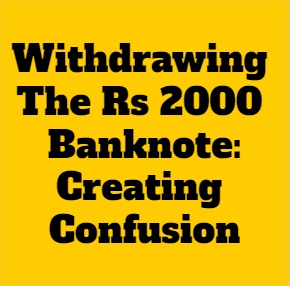

By Our Editorial Team
First publised on 2023-05-23 06:04:32
Most government policy decisions are said to be well thought out - or they should be. Since they are well thought out, they must be clear and must not cause problems for the citizens. But the decision of the RBI to withdraw the Rs 2000 banknote with a deadline to deposit or exchange them does not seem to be one such policy decision.
Consider the fact that the RBI has stopped printing Rs 2000 banknotes from 2018 onwards. Hence, their share in the total currency in the economy has dropped down to just 11%. Banks have for long stopped giving Rs 2000 currency notes when customers withdraw cash. They have stopped receiving the same from currency chests and were only giving such notes in withdrawals by customers as and when another customer deposited the same.
Hence, if the current position was allowed to continue, with a little more strictness (with direction to banks not to issue any notes to the public but deposit them with the currency chests as and when any customer deposited the same in their accounts), the share of the said notes would have been reduced to an insignificant number in a couple of years. But the RBI public circular has caused an unnecessary alarm.
The worst part is that the apex bank has said that the notes remain legal tender and then prescribed a timeline within which they have to be exchanged or deposited. This has confused everyone and it is demonetization by another name. The very fact that the RBI has been forced to issue several daily clarifications shows that the decision was not well thought out and the original announcement lacked clarity. The apex bank has faltered. It should have let the note remain legal tender and should have squeezed it out of circulation by prohibiting banks from issuing it back. That would have not confused the citizenry and not caused such alarm.










